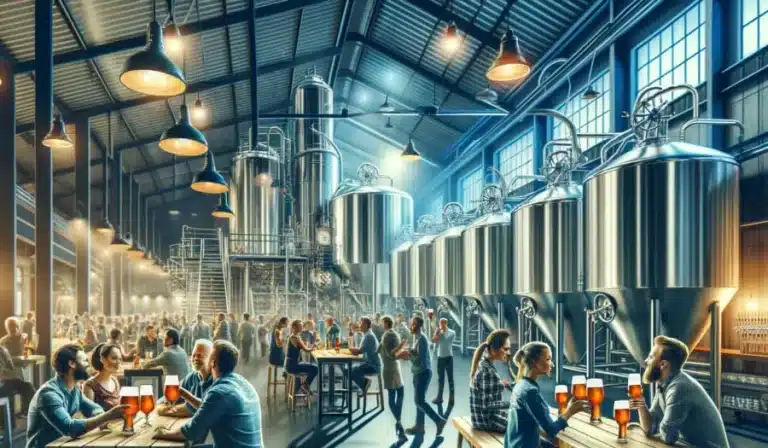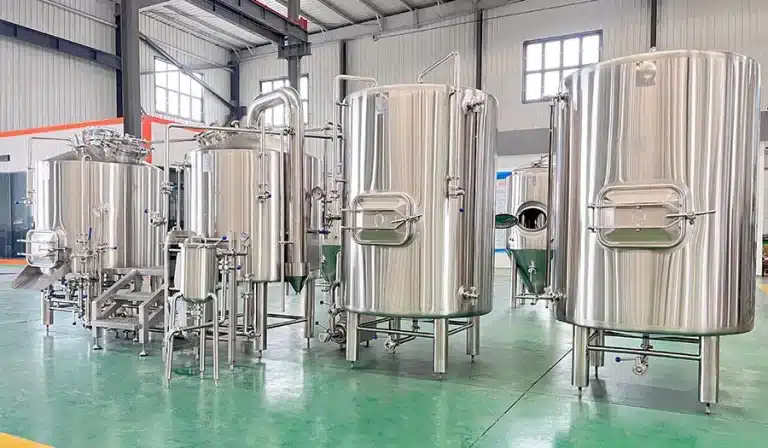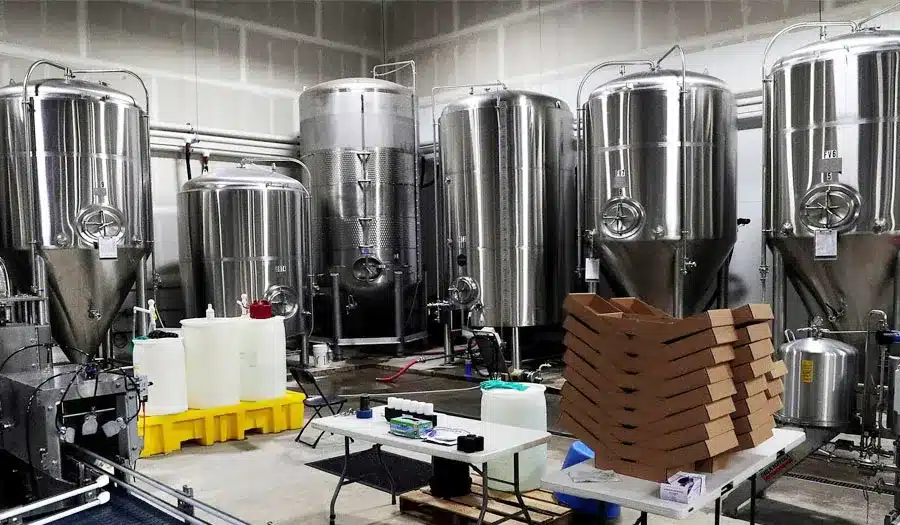With the development of the craft beer brewing industry, craft beer is becoming more and more popular and accepted by people. Craft beer emphasizes hand-brewing, unique flavor, and innovative taste, so the selection of craft beer equipment is crucial to the production of craft breweries. This article will detail the main brewing equipment required by craft breweries, and discuss how to choose suitable equipment to meet the brewing needs of different scales and styles.
Craft Beer Brewing Process
- Malt preparation: Grind barley malt or other grains and prepare them for mash.
- Mash: Mix malt with water and heat it to extract sugar and produce wort.
- Boiling: Heat the wort to boiling, add hops and other ingredients, and boil it to extract bitterness and aroma.
- Fermentation: Cool the boiled wort, add yeast to start fermentation, and convert sugar into alcohol.
- Post-fermentation and packaging: After fermentation, the beer is clear, mature, filtered, and packaged to complete the production of the final craft beer.

Brewing systems required for craft breweries
- Malt grinder: Malt grinders are the most basic equipment in craft breweries. Its main function is to be one of the large barley malt grinders, which can better release sugar during the mash process. The crushed malt is called “wheat flour”, which needs to be evenly crushed and not too fine to ensure that it can smoothly contact water and convert into soluble sugar during the mash process.
- Mash system: mash is a critical step in craft beer, which determines the flavor and alcohol content of the final beer. The mash system mainly includes a mash pot, mash tank, and temperature control system. The mash pot is a device that mixes wheat flour with hot water and heats it at a controlled temperature to convert starch into sugar.
- Filtration system: The filtration system is usually part of the mash equipment and is used to separate the wort produced after mash from the spent grains. This process is called “slag”, which can remove the spent grains and unconverted solids, leaving clear wort.
- Cooling system: After boiling, the wort needs to be cooled quickly so that it can enter the fermentation stage after the addition of yeast. There are two main types of cooling systems: plate coolers and tube coolers.
- Fermentationssystem: The fermentation system is responsible for converting the saccharified wort into alcohol. Yeast undergoes the fermentation process in the fermenter, converting sugar into alcohol and fermenting. The fermenter is usually made of stainless steel with good sealing and temperature control.
- Cleaning system: A reliable cleaning system is essential to maintain the hygiene of brewing equipment. Proper cleaning and sanitation prevent contamination and ensure the consistency of the final product.
Important parts of craft beer equipment
Brühkessel
A brew kettle is a large container used to boil wort, which comes in a variety of sizes to accommodate different batches. This is a key step in the brewing process, where hops are added to add bitterness and aroma to the beer. These pots are usually made of stainless steel or copper. The material composition of the brewing tank is the main factor to consider, and both copper and stainless steel are good choices. Although stainless steel is less expensive and requires less maintenance, copper will provide better beer flavor because of its catalytic ability. It just depends on how much you are willing to spend and what you want.
Filter barrel
The filter barrel is used to separate the solid residue (malt residue) from the mash. Its working principle is to use a screen or filter plate at the bottom to separate the mash (malt residue) from the malt residue by flowing liquid. This step is to get clear wort. Beer filters are used to further remove tiny particles such as yeast and malt residue to ensure the freshness and taste of the beer. Depending on the different brewing methods, the beer can be coarsely filtered or finely filtered.

Kessel
The boiler is used to heat the wort to boiling point and add hops during the process. Hops release bitter and aromatic components during the boiling process, and also have a sterilizing effect, ensuring the safety of the wort. The boiling time and temperature of hops are key to the bitterness, aroma, and flavor of the hops.
Würzekühler
After boiling, the hot wort needs to be cooled quickly before yeast can be added for fermentation. A wort cooler can effectively reduce the temperature of the wort to prevent contamination and unpleasant odors. Choose equipment with high cooling efficiency to reduce the time the wort is in an environment with an unsuitable temperature.
Fermenter
The fermenter is where the magic of fermentation happens. Yeast converts sugars into alcohol and carbon dioxide, and the fermenter provides a controlled environment for this process. These tanks are essential to determining the flavor profile and alcohol content of the beer. Fermentation barrels or kegs are essential to any home brewing environment. Beer can be fermented in a variety of containers, from plastic barrels to glass bottles. During the fermentation process, yeast sugars are converted into alcohol and fermentation agents. According to the fermentation type, the fermentation tank is divided into an upper fermentation tank (for producing ale beer) and a lower fermentation tank (for producing lager beer).
Verpackungsmaterial
The packaging equipment for craft beer includes bottling, canning, and barreling systems. Packaging equipment includes automatic packaging machines, capping machines, labeling machines, etc., which can improve production efficiency and ensure the quality of beer. Common beer packaging forms include bottles, cans, and barrels.
How to choose the right craft beer equipment?
Brewery scale and production capacity
The choice of equipment needs to be determined based on the size of the brewery and the expected production capacity. Small craft breweries may choose smaller-scale equipment for manual operation and flexible adjustment, while large breweries require more efficient and automated equipment to meet the needs of mass production.
Materials and structures
The choice of materials and structures will affect the durability and maintenance requirements of the equipment. Stainless steel is popular for its long service life and corrosion resistance.

Budget und Kosten
The investment in equipment is a long-term cost, and the importance of budget and equipment needs to be considered when selecting equipment. Although the quality and performance of high-end equipment are generally better, it is also necessary to evaluate whether it matches the scale and expected output of the brewery.
Technical support and after-sales service of equipment
The quality of the equipment is very important, but more importantly, whether the supplier provides comprehensive after-sales service and technical support. Ensure that the equipment supplier can provide timely repair, maintenance, upgrade, and other services, and also avoid production affected by equipment failure.
Maintenance and cleaning of craft beer brewing equipment
- Regular inspection and maintenance: Regular inspections of brewing equipment are necessary so that potential problems can be discovered and resolved before they escalate. Implementing a maintenance plan keeps your equipment in top condition, reduces the risk of failure, and ensures consistent beer quality.
- Cleaning procedures and best practices: Thorough cleaning and sanitization are essential to the brewing process to prevent contamination and odors. Develop and follow strict cleaning procedures for all equipment to ensure that the equipment is free from bacteria and other contaminants.
- Equipment problems can still occur despite meticulous maintenance. Familiarize yourself and your team with common troubleshooting techniques to quickly resolve issues and minimize downtime.
FAQ
Wie viel kostet die Ausrüstung zum Brauen von Craft Beer?
The cost of craft beer brewing equipment can vary greatly depending on the size and complexity of the brewery. Small home brewing equipment can cost hundreds of dollars, while commercial breweries may require investments of tens of thousands of dollars or even more.
What basic equipment does a craft brewery need?
Basic brewing equipment includes a malt grinder, mash tun, lauter tun, boiling pot, cooler, fermentation tank, filling equipment, and cleaning and disinfection equipment.
What materials are commonly used in brewery equipment?
Stainless steel is the most commonly used material in beer brewing equipment due to its durability, corrosion resistance, and easy cleaning.
Wie wählt man einen geeigneten Gärtank aus?
When choosing a fermentation tank, consider the brewing batch, fermentation temperature control, and whether secondary fermentation is required. At the same time, the material will also affect the quality of the beer. Stainless steel is usually the most suitable choice.




